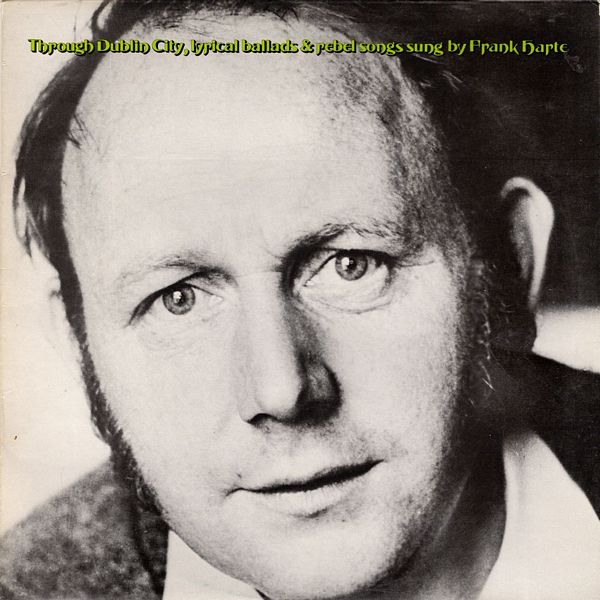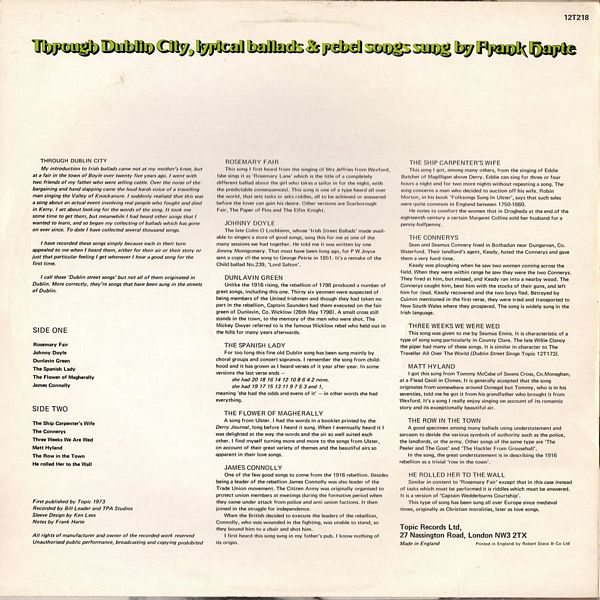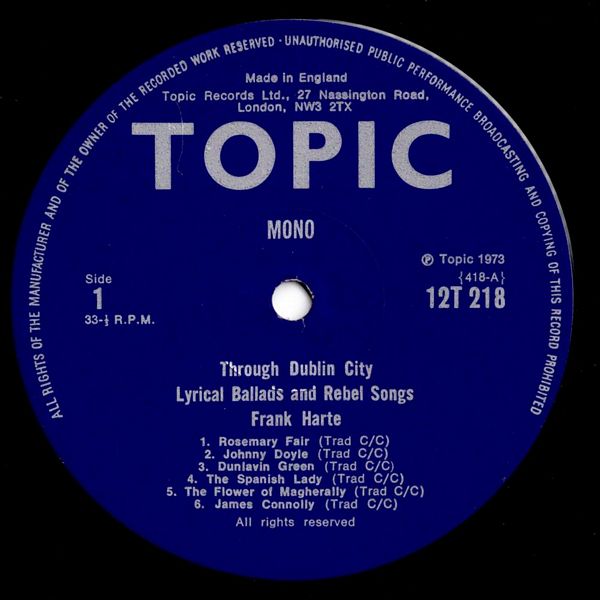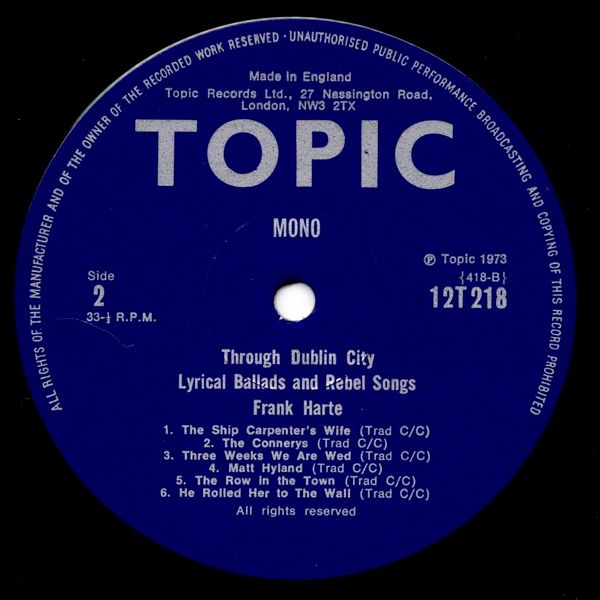
 |


 |
Sleeve Notes
THROUGH DUBLIN CITY
My introduction to Irish ballads came not at my mother's knee, but at a fair in the town of Boyle over twenty-five years ago. I went with two friends of my father who were selling cattle. Over the noise of the bargaining and hand slapping came the loud harsh voice of a travelling man singing the Valley of Knockanure. I suddenly realised that this was a song about an actual event involving real people who fought and died in Kerry. I set about looking for the words of the song. It took me some time to get them, but meanwhile I had heard other songs that I wanted to learn, and so began my collecting of ballads which has gone on ever since. To date I have collected several thousand songs.
I have recorded these songs simply because each in their turn appealed to me when I heard them, either for their air or their story or just that particular feeling I get whenever I hear a good song for the first time.
I call these 'Dublin street songs' but not all of them originated in Dublin. More correctly, they're songs that have been sung in the streets of Dublin.
ROSEMARY FAIR — This song I first heard from the singing of Mrs. Jeffries from Wexford, (she sings it as 'Rosemary Lane' which is the title of a completely different ballad about the girl who takes a sailor in for the night, with the predictable consequences). This song is one of a type heard all over the world, that sets tasks or asks riddles, all to be achieved or answered before the lover can gain his desire. Other versions are Scarborough Fair, The Paper of Pins and The Elfin Knight.
JOHNNY DOYLE — The late Colm O Lochlainn, whose 'Irish Street Ballads' made available to singers a store of good songs, sang this for me at one of the many sessions we had together. He told me it was written by one Jimmy Montgomery. That must have been long ago, for P W Joyce sent a copy of the song to George Petrie in 1851. It's a remake of the Child ballad No.239, 'Lord Salton'.
DUNLAVIN GREEN — Unlike the 1916 rising, the rebellion of 1798 produced a number of great songs, including this one. Thirty-six yeomen were suspected of being members of the United Irishmen and though they had taken no part in the rebellion, Captain Saunders had them executed on the fair green of Dunlavin, Co. Wicklow (26th May 1798). A small cross still stands in the town, to the memory of the men who were shot. The Mickey Dwyer referred to is the famous Wicklow rebel who held out in the hills for many years afterwards.
THE SPANISH LADY — For too long this fine old Dublin song has been sung mainly by choral groups and concert sopranos. I remember the song from childhood and it has grown as I heard verses of it year after year. In some versions the last verse ends —
she had 20 18 16 14 12 10 8 6 4 2 none,
she had 19 17 15 13 11 9 7 5 3 and 1,
meaning 'she had the odds and evens of it' — in other words she had everything.
THE FLOWER OF MAGHERALLY — A song from Ulster. I had the words in a booklet printed by the Derry Journal, long before I heard it sung. When I eventually heard it, I was delighted at the way the words and the air so well suited each other. I find myself turning more and more to the songs from Ulster, on account of their great variety of themes and the beautiful airs so apparent in their love songs.
JAMES CONNOLLY — One of the few good songs to come from the 1916 rebellion. Besides being a leader of the rebellion James Connolly was also leader of the Trade Union movement. The Citizen Army was originally organised to protect union members at meetings during the formative period when they came under attack from police and anti-union factions. It then joined in the struggle for independence.
When the British decided to execute the leaders of the rebellion, Connolly, who was wounded in the fighting, was unable to stand, so they bound him to a chair and shot him.
I first heard this song sung in my father's pub. I know nothing of its origin.
THE SHIP CARPENTER'S WIFE — This song I got, among many others, from the singing of Eddie Butcher of Magilligan above Derry. Eddie can sing for three or four hours a night and for two more nights without repeating a song. The song concerns a man who decided to auction off his wife. Robin Morton, in his book 'Folksongs Sung in Ulster', says that such sales were quite common in England between 1750-1860.
He notes to comfort the women that in Drogheda at the end of the eighteenth century a certain Margaret Collins sold her husband for a penny-halfpenny.
THE CONNERYS — Seán and Seamus Connery lived in Bothadun near Dungarvan, Co. Waterford. Their landlord's agent, Keady, hated the Connerys and gave them a very hard time.
Keady was ploughing when he saw two women coming across the field. When they were within range, he saw they were the two Connerys. They fired at him, but missed, and Keady ran into a nearby wood. The Connerys caught him, beat him with the stocks of their guns, and left him for dead. Keady recovered, and the two boys fled. Betrayed by Cuimin mentioned in the first verse, they were tried and transported to New South Wales where they prospered. The song is widely sung in the Irish language.
THREE WEEKS WE WERE WED — This song was given to me by Seamus Ennis. It is characteristic of a type of song sung particularly in County Clare. The late Willie Clancy the piper had many of these songs. It is similar in character to The Traveller All Over the World (Dublin Street Songs Topic 12T172).
MATT HYLAND — I got this song from Tommy McCabe of Swans Cross, Co. Monaghan, at a Flead Ceoil in Clones. It is generally accepted that the song originates from somewhere around Donegal but Tommy, who is in his seventies, told me he got it from his grandfather who brought it from Wexford. It's a song I really enjoy singing on account of its romantic story and its exceptionally beautiful air.
THE ROW IN THE TOWN — A good specimen among many ballads using understatement and sarcasm to deride the various symbols of authority such as the police, the landlords, or the army. Other songs of the same type are 'The Peeler and The Goat' and 'The Hackler from Grousehall'.
In the song, the great understatement is in describing the 1916 rebellion as a trivial 'row in the town'.
HE ROLLED HER TO THE WALL — Similar in content to 'Rosemary Fair' except that in this case instead of tasks which must be performed it is riddles which must be answered. It is a version of 'Captain Wedderburns Courtship'.
This type of song has been sung all over Europe since medieval times, originally as Christian moralities, later as love songs.